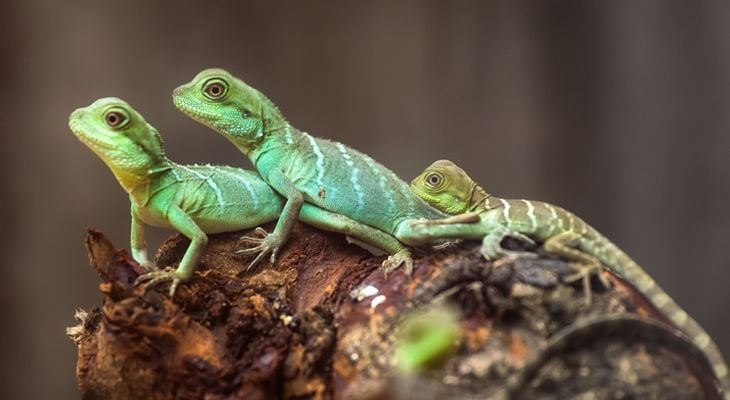Is your puppy old enough for adult dog food?
Read more

People with limited living quarters may find that reptiles such as lizards or turtles fit perfectly into their lifestyles. Before deciding on a reptile, learn as much as possible about them and their needs. Poisonous snakes and certain reptiles should never be kept as pets. Ask your veterinarian about the suitability of a particular animal before you make your decision. There are many things to consider before committing to a reptile as a pet.
Finding out if a Pet is Legal Where You Live
Many areas have enacted laws pertaining to keeping reptiles. Some are general and some are quite specific; in many places any reptiles that are considered dangerous (venomous snakes, alligators, etc.) are illegal but some places are even more restrictive (for example, in some states all constricting snakes including ball pythons are illegal).
Salmonella Risks and Prevention
All reptile owners need to be informed about Salmonella infections. While the risks shouldn't keep most people from keeping reptiles since with the proper management the risks are minimal. Still, owners should be aware of the risks, and the US Centers for Disease Control recommends that certain risk groups should be careful about contact with reptiles and amphibians.
The Importance of Light and Heat
Many problems with keeping reptiles can be traced back to not providing the proper environmental conditions, particularly heat. Proper lighting is also important for many reptiles. The equipment to provide the proper heat and light to captive reptiles is often quite expensive, but is absolutely essential to keeping pet reptiles healthy. It is important to find out exactly what conditions your reptile needs and never cut corners when it comes to meeting those conditions!
Why Choose Captive Bred Reptiles
There are numerous reasons why you should pick a captive bred reptile if at all possible, as explained here.
How to Pick a Healthy Reptile
It is important to keep in mind that depending on where you get a reptile, it may be very stressed, dehydrated, and prone to illness. Here are some items to look for when buying your reptile to increase the chances of picking out a healthy pet reptile.
While there are many types of reptiles that could be good pets, here we cover a few you could consider.
-
October Newsletter: When to Switch from Puppy Food to Dog Food
Category: Newsletter Library
-
October Newsletter: How to Socialize Your Kitten
Category: Newsletter Library
-
September Newsletter: At What Age Should You Start Brushing Your Cat's Teeth?
Category: Newsletter Library
-
September Newsletter: What to Expect When You Adopt a Senior Dog
Category: Newsletter Library
-
August Newsletter: Tips on Grooming Your New Puppy
Category: Newsletter Library
-
August Newsletter: How to Introduce Your Cat to Your Dog
Category: Newsletter Library
-
July Newsletter: Signs of Heatstroke in Pets
Category: Newsletter Library
-
July Newsletter: What Is Leash Reactivity and How Is It Managed?
Category: Newsletter Library
Barking, growling and straining could mean your dog suffers from leash reactivity. Fortunately, help is available.
Read more -
June Newsletter: 5 Calming Items That Can Reduce Cat Anxiety
Category: Newsletter Library
-
June Newsletter: How to Reduce Excessive Dog Shedding
Category: Newsletter Library
-
May Newsletter: Which Human Foods Are Safe for Dogs?
Category: Newsletter Library
-
May Newsletter: Items That Should Be Included in Your Pet's First Aid Kit
Category: Newsletter Library
-
April Newsletter: The Benefits of Dental Chews for Dogs
Category: Newsletter Library
-
April Newsletter: At What Age Should You Spay or Neuter Your Pet?
Category: Newsletter Library
Not sure when to spay or neuter your new pet? Take a look at the latest surgery recommendations.
Read more -
March Newsletter: Tips to Prevent Your Cat from Overgrooming
Category: Newsletter Library
Is your cat's overgrooming habit causing hair loss or irritated skin? Find out what you can do about the problem.
Read more -
March Newsletter: How and When to Introduce Solid Food to Your Kitten
Category: Newsletter Library
